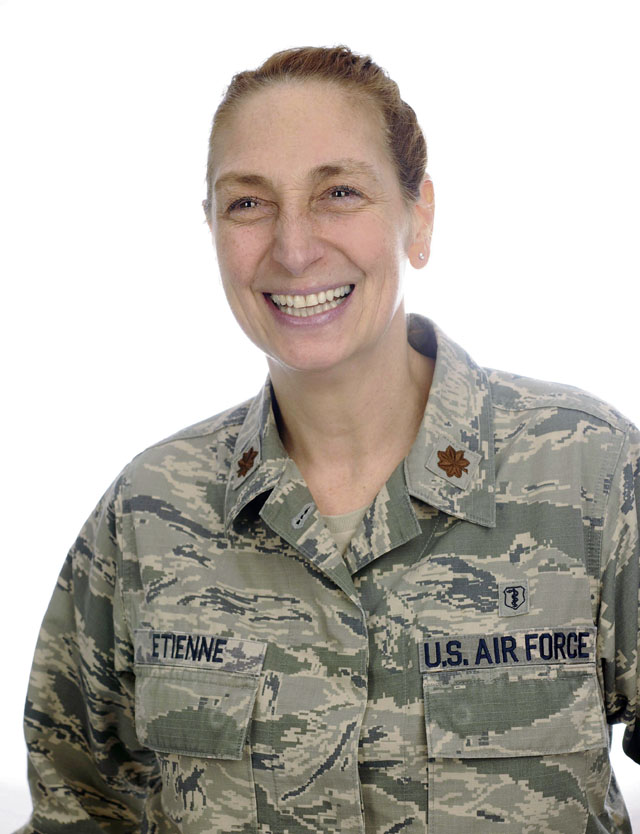
“Humans are very resilient,” said the red-haired, uniformed woman. “People are a lot stronger than they think they are, and have the capacity to endure horrific circumstances through the sheer will to survive.”
Maj. Neysa Etienne has seen people endure some of the worst situations. She is the 86th Medical Squadron, Clinical Medicine flight commander and primary Survival, Evasion, Resistance, and Escape psychologist for U.S. Air Forces in Europe and U.S. European Command. Etienne has been helping to repatriate victims of isolation for the past two years.
“I’ve worked with individuals held captive from five-and-a-half years, to 8 years, including children born into captivity,” Etienne said. “Since 2015, there have been 21 individuals who came through Germany from these types of situations.” She paused and chose her words carefully. “They’ve been pretty severe situations.”
Examples of the kind of isolating situations Etienne’s returnees endure include terror networks taking individuals captive, or a helicopter going down in a remote or hostile location.
Etienne joined the military as a licensed clinical professional. Before that, she worked for the Department of Corrections and the Department of Veteran’s Affairs, but she always wanted to be part of the Department of Defense.
Currently stationed at Landstuhl Regional Medical Center, Etienne works with both U.S. and allied partner nation active duty members and civilians. She recently received the Department of Defense-wide Allied Health Leadership Excellence Award for senior clinician of the year. She also works with NATO partner nation psychologists to include Canada, Great Britain, Croatia, Hungary and Poland with the intent to help prepare and develop programs for recovered personnel. Both the personnel recovery and medical communities often invite her to speak and share these extensive experiences.
Etienne’s passion for helping service members perform to the best of their ability began with an experience she had at a younger age.
“When I was about 10 years old I found a box in the attic,” Etienne said. ”I brought it to my bedroom. It was full of war paraphernalia, pictures, and an old uniform.”
Etienne’s father had been a combat vet in Vietnam, but she never even knew he was in the military.
“When my dad came home from work and saw what I had found it looked like he’d seen a ghost,” Etienne said. “That started a dialogue between my father and me. It opened up a whole world for both of us because he’d never talked about his experiences in the military or in combat.”
As a child, Etienne listened to her father’s many stories about his time at war, and a whole new world of his history opened up to her.
“I think that significantly impacted me at an early age,” Etienne said. “It helped me learn about my dad and understand his behavior a little bit better.”
In the months and years that followed, Etienne watched her father start to re-engage and make contact with his former Army friends. He also started to attend reunions.
“What I got to see in my own home, was a transformation as a result of my dad telling his story,” Etienne said. “People coming out of captivity have a story to tell, and part of my role is to help them tell that story.”
Even after practicing psychology in the civilian sector for years, Etienne retained a desire to work in a military setting because of her connection to her father. She achieved her desires, and says she is now privileged to work with some of the world’s most experienced military medical professionals.
Her time at LRMC has led Etienne to some one of the most significant cases to date.
“Oftentimes, depending on the length of captivity, victims may have had very little human contact and after years of isolation and abuse people may struggle with human interaction,” Etienne said. “Upon reception, individuals will often be in a state of shock.”
Etienne explained that building rapport and establishing trust are key to helping people start communicating about what they have endured.
“Before these missions are over, we often witness some amazing transformations,” Etienne said. “Watching people walk off the unit on their own, engage in conversations, and reconnect with what is meaningful in their life is a tremendous honor and privilege. Sometimes, at the beginning of a mission, people are skeptical about what we will be able to accomplish because of the severity, but time and again, our team has witnessed radical changes and observed first-hand proof of exceptional, human resiliency.”
Etienne said that the missions may last one to three weeks. The medical team essentially works round the clock to help reestablish predictability and control and empower the returnee as they regain ownership of their life and freedom.
“Sometimes it almost feels as if we are rebuilding a human,” Etienne said.
The team also spends a significant amount of time with the returnees in debriefing and decompression activities, providing an ideal environment for them to tell their story.
Etienne said that witnessing these recoveries has been among the most meaningful experiences of her career and increased her understanding of human capacity.
Perhaps one of the reasons Etienne believes so strongly in resiliency is because she had to find her own while accomplishing SERE Level C training, the most intense SERE training available. It pushes participants to their limits as they endure austere environments and simulated captivity.
“Sometimes people in the class are surprised at themselves at how resourceful they became in those situations, and the different ways that they can mark time,” Etienne recalled. “What we know from history, research and many of these recent, real-world recoveries is that maintaining a hope, keeping faith in something or someone, and establishing a sense of meaning and purpose tend to be positive indicators for a more rapid recovery post isolation.”
Etienne reflected further on her experiences.
“I think so many of us sell ourselves short,” Etienne said. “I often stand in awe at human potential: what people are capable of doing, creating and achieving.”


